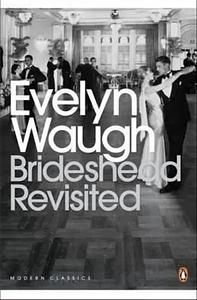Take a photo of a barcode or cover
Waugh's lavishly layered tale of friendship, faith, family, adultery, and days gone by is positively marinated in nostalgia for pre-war Britain and upper-class ennui.
Much of the story, taken in isolation would amount to drivel (akin to Wodehouse without humor or Christie without a mystery). The exquisite ending, however, pulls it into literary excellence.
Much of the story, taken in isolation would amount to drivel (akin to Wodehouse without humor or Christie without a mystery). The exquisite ending, however, pulls it into literary excellence.
Taking me back to the old-style yet fancinating Britain and the aristocraticy then.
I'm not sure what the point of this book was. Nobody should have such wealth that they can futz around doing nothing and not going to class and dining and gossiping about nothing, and also it was quite obtuse. Like, for the first half the book I was just thinking, Charles and Sebastian should just hurry up and bang, and then they never* did even though they were together constantly and only wanted to be together in their apartment or whatever.
*and when I say never did, I mean Waugh was never explicit about what their deal was, so it's possible I guess.
And then it took a turn in the second half where Sebastian became a raging alcoholic and I was like WHEW thank goodness they never* banged because this is a MESS.
But then suddenly Charles is married with two kids and he's never met one of them because he's very very busy painting in South America and his convenient wife is very busy throwing parties WHO IS WATCHING THESE CHILDREN, and they're both cheating on each other, but it's again, very obtuse. And he just CANNOT leave the people in Sebastian's family alone.
Anyway, I finished just in the nick of time for book club, and it'll make for a good discussion, based on the fact that a friend and I stood and talked about it in disbelief for a good 10 minutes the other day before either of us had finished.
CW: stillbirth (off-page, but mentioned several times)
*and when I say never did, I mean Waugh was never explicit about what their deal was, so it's possible I guess.
And then it took a turn in the second half where Sebastian became a raging alcoholic and I was like WHEW thank goodness they never* banged because this is a MESS.
But then suddenly Charles is married with two kids and he's never met one of them because he's very very busy painting in South America and his convenient wife is very busy throwing parties WHO IS WATCHING THESE CHILDREN, and they're both cheating on each other, but it's again, very obtuse. And he just CANNOT leave the people in Sebastian's family alone.
Anyway, I finished just in the nick of time for book club, and it'll make for a good discussion, based on the fact that a friend and I stood and talked about it in disbelief for a good 10 minutes the other day before either of us had finished.
CW: stillbirth (off-page, but mentioned several times)
emotional
reflective
slow-paced
Plot or Character Driven:
Character
Strong character development:
Yes
Loveable characters:
Yes
Diverse cast of characters:
Yes
It seems what this book is famous for is its bygone definition of Englishness, but to me the relationships were enchanting and vivid, and that's what held me. Their contrast with the ornate settings created such a rich whirlwind picture of visiting the world at the time. (The story is in many more places than just the titular estate; there's lots of travel). Some of the words from the book resonated as themes themselves, "thwarted", "the forerunner". They've kept me thinking. And it surprised me; I didn't expect it to end for the reasons it did. When war is coming at the end, you know that's bad enough.
My favorite part, I suppose not surprisingly, was the chapter in the huge storm on the ocean liner. It is miraculous and perfectly dramatic. What it brings about is so touching and, I guess, I just seem to really, really like a machina of water in a novel. Sue me please.
Thanks to Evan, for the birthday present.
By the way, what a terrible movie-related book cover. It is really unsightly. (Though the Everyman edition within is of course lovely.) So unlikable that my friend brought over a new dustjacket from work, which is what's on the shelf now.
My favorite part, I suppose not surprisingly, was the chapter in the huge storm on the ocean liner. It is miraculous and perfectly dramatic. What it brings about is so touching and, I guess, I just seem to really, really like a machina of water in a novel. Sue me please.
Thanks to Evan, for the birthday present.
By the way, what a terrible movie-related book cover. It is really unsightly. (Though the Everyman edition within is of course lovely.) So unlikable that my friend brought over a new dustjacket from work, which is what's on the shelf now.
dark
reflective
sad
slow-paced
Plot or Character Driven:
Character
Strong character development:
Complicated
Loveable characters:
No
Diverse cast of characters:
No
Flaws of characters a main focus:
Complicated
challenging
medium-paced
Plot or Character Driven:
Character
Strong character development:
Yes
Loveable characters:
Complicated
Diverse cast of characters:
Yes
It's terribly frustrating how classic novels said to be excellent are, in fact, excellent, once I get myself to read them. I listened to this as an audiobook which was challenging at times, and slow at times, and sometimes I ignored the book for a month before getting back to it and continuing. But I finished and it is really very good.
I don't think it is a book about religion at any point, which was something I saw mentioned in other reviews. It's a book about people, and a lot of the people are religious, and religion influences them greatly whether they like it or not. Does that count make it a book about religion? The people are all people, many of them deeply flawed, and it's quite sad at points, but it is humorous at others. I don't know how to describe this. There's people, and they live their lives and there's ups and downs.
I don't think it is a book about religion at any point, which was something I saw mentioned in other reviews. It's a book about people, and a lot of the people are religious, and religion influences them greatly whether they like it or not. Does that count make it a book about religion? The people are all people, many of them deeply flawed, and it's quite sad at points, but it is humorous at others. I don't know how to describe this. There's people, and they live their lives and there's ups and downs.
slow-paced
Plot or Character Driven:
Character
Loveable characters:
No
Diverse cast of characters:
No
Flaws of characters a main focus:
Yes
A very alow moving book. Be aware there is a lot of bigotry in the book.
dark
emotional
funny
reflective
sad
medium-paced
Plot or Character Driven:
Character
Strong character development:
No
Loveable characters:
Complicated
Diverse cast of characters:
No
Flaws of characters a main focus:
Complicated
Veryyyy slow and boring #country vibes at the start but picked up towards the end. Heartbreaking display of how alcoholism impacts individuals and their families. I also enjoyed the themes of nostalgia—no one can escape the passing of time.
I love British Literature. I took a few different courses on it in college. Having heard the titles of many classics my reading list is gargantuan. Comes with being an English major. This was one such book. But I've been questioning my desire to read the classics as of late.
A classic, too often, is code for a white dude that other white dudes liked in the Days of Yore. Sometimes this white dude agrees, I read Dickens and Shakespeare and love them both. And while that dry wit and writing style that defines the writing of a lot of those old white dudes is something I still enjoy no matter what, the plot and the characters are what have been making me feel increasingly uncomfortable.
I simply have no patience for the ennui that rich white men are burdened with in these stories. My reading as taken on a much more diverse bent and the real struggles of the poor, of the minorities, of women, make me less sympathetic to the plight of the young man trying to find his way in the world on the back of his family money.
I got about 50 pages in and I just couldn't continue. And I'm slowly becoming ok with that.
A classic, too often, is code for a white dude that other white dudes liked in the Days of Yore. Sometimes this white dude agrees, I read Dickens and Shakespeare and love them both. And while that dry wit and writing style that defines the writing of a lot of those old white dudes is something I still enjoy no matter what, the plot and the characters are what have been making me feel increasingly uncomfortable.
I simply have no patience for the ennui that rich white men are burdened with in these stories. My reading as taken on a much more diverse bent and the real struggles of the poor, of the minorities, of women, make me less sympathetic to the plight of the young man trying to find his way in the world on the back of his family money.
I got about 50 pages in and I just couldn't continue. And I'm slowly becoming ok with that.





